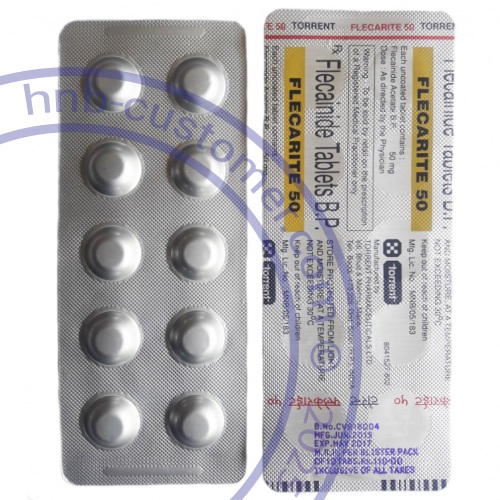Flecainidine tablets
What is this medicine?
FLECAINIDINE is in a group of drugs called Class IC anti-arrhythmics. It affects the way your heart beats. Flecainide is used in certain situations to prevent serious heart rhythm disorders. Flecainide may also be used for other purposes not listed in this medication guide.
What should I tell my health care providers before I take this medicine?
You should not use this medication if you are allergic to flecainide, or if you have certain heart conditions, especially "AV block" (unless you have a pacemaker). Before using flecainide, tell your doctor if you are allergic to any drugs, or if you have:
-
congestive heart failure;
-
a heart condition called "sick sinus syndrome";
-
an electrolyte imbalance;
-
liver disease;
-
kidney disease;
-
if you have a pacemaker; or
-
if you have had a heart attack within the past 2 years.
If you have any of these conditions, you may need a dose adjustment or special tests to safely use flecainide. FDA pregnancy category C. This medication may be harmful to an unborn baby. Tell your doctor if you are pregnant or plan to become pregnant during treatment. Flecainide can pass into breast milk and may harm a nursing baby. Do not use this medication without telling your doctor if you are breast-feeding a baby.
How should I use this medicine?
You will need to receive your first few doses of flecainide in a hospital setting in case the medication causes serious side effects. Your heart rate will be constantly monitored using an electrocardiograph or ECG (sometimes called an EKG). This machine measures electrical activity of the heart.
Take flecainide exactly as it was prescribed for you. Do not take the medication in larger amounts or for longer than recommended by your doctor. Follow the directions on your prescription label. Your doctor may occasionally change your dose to make sure you get the best results from this medication.
To be sure this medication is helping your condition, your blood may need to be tested on a regular basis. Do not miss any scheduled appointments.
What if I miss a dose?
Take the missed dose as soon as you remember. If it is almost time for your next dose, wait until then to take the medicine and skip the missed dose. Do not take extra medicine to make up the missed dose.
What may interact with this medicine?
Before taking flecainide, tell your doctor if you are taking any of the following medicines:
-
cimetidine (Tagamet),
-
digoxin (digitalis, Lanoxin);
-
a diuretic (water pill);
-
verapamil (Verelan, Calan, Isoptin);
-
seizure medication such as carbamazepine (Carbatrol, Tegretol), phenobarbital (Solfoton), or phenytoin (Dilantin);
-
other heart rhythm medications such as amiodarone (Cordarone), disopyramide (Norpace), or quinidine (Quinaglute, Quinidex); or
-
a beta-blocker such as atenolol (Tenormin), labetalol (Normodyne, Trandate), metoprolol (Lopressor, Toprol), propranolol (Inderal, InnoPran), sotalol (Betapace), timolol (Blocadren), and others.
This list is not complete and there may be other drugs that can interact with flecainide. Tell your doctor about all your prescription and over-the-counter medications, vitamins, minerals, herbal products, and drugs prescribed by other doctors. Do not start a new medication without telling your doctor.
What side effects may I notice from this medicine?
Get emergency medical help if you have any of these signs of an allergic reaction: hives; difficulty breathing; swelling of your face, lips, tongue, or throat. Call your doctor at once if you have a serious side effect such as:
-
slow heart rate, weak pulse, fainting, slow breathing (breathing may stop);
-
dizziness, fainting, fast or pounding heartbeat;
-
feeling short of breath, even with mild exertion;
-
swelling, rapid weight gain;
-
low potassium (confusion, uneven heart rate, extreme thirst, increased urination, leg discomfort, muscle weakness or limp feeling);
-
high potassium (slow heart rate, weak pulse, muscle weakness, tingly feeling);
-
pale skin, easy bruising or bleeding, unusual weakness; or
-
jaundice (yellowing of the skin or eyes).
Less serious side effects may include:
-
dizziness;
-
tremor or shaking;
-
headache;
-
anxiety or depression;
-
vision problems;
-
nausea, vomiting, stomach pain;
-
diarrhea, constipation; or
-
numbness or tingling.
This is not a complete list of side effects and others may occur.
What should I watch for while using this medicine?
Follow your doctor's instructions about any restrictions on food, beverages, or activity while you are using flecainide.
Where should I keep this medicine?
Store flecainide at room temperature away from moisture, heat, and light.





